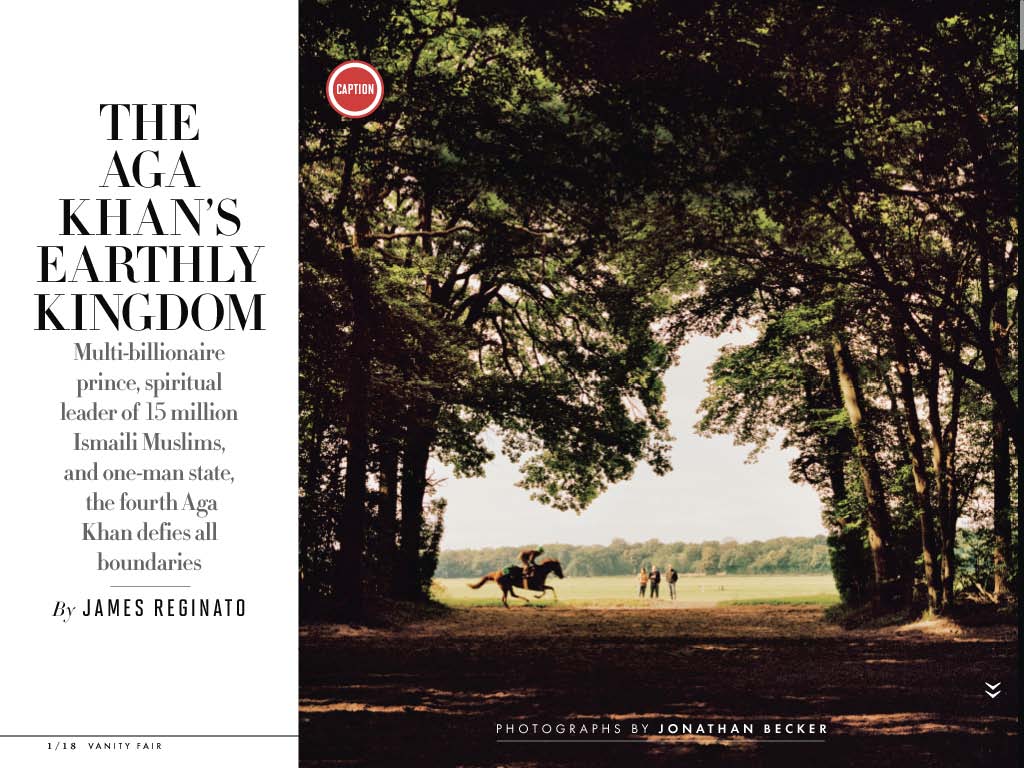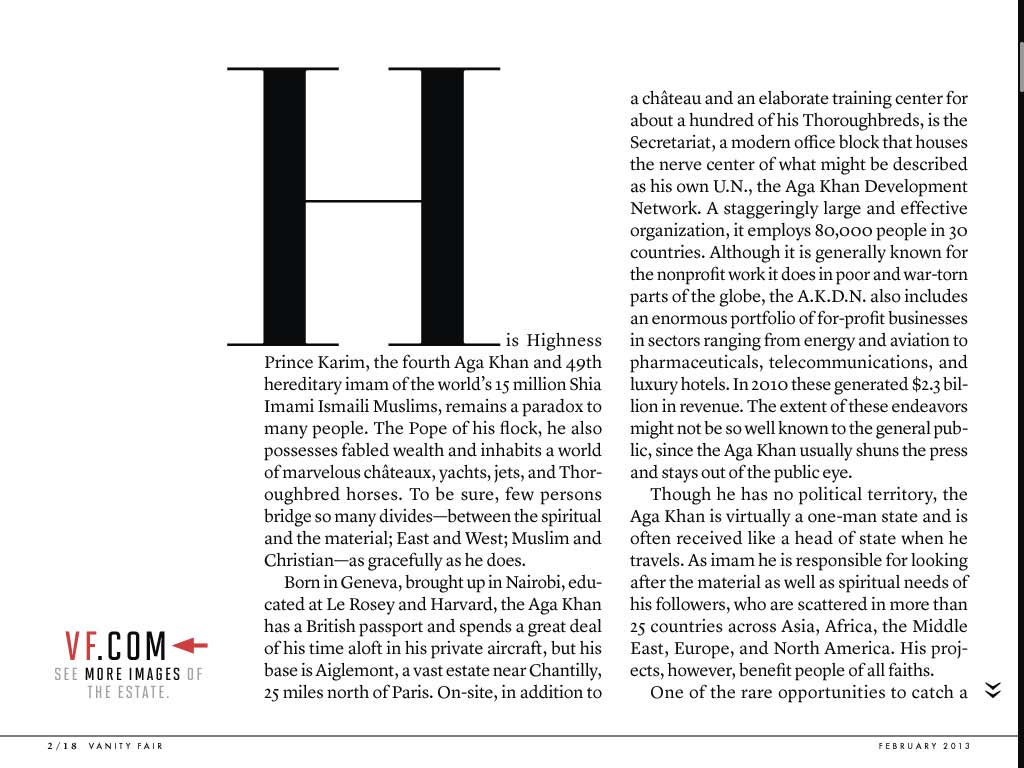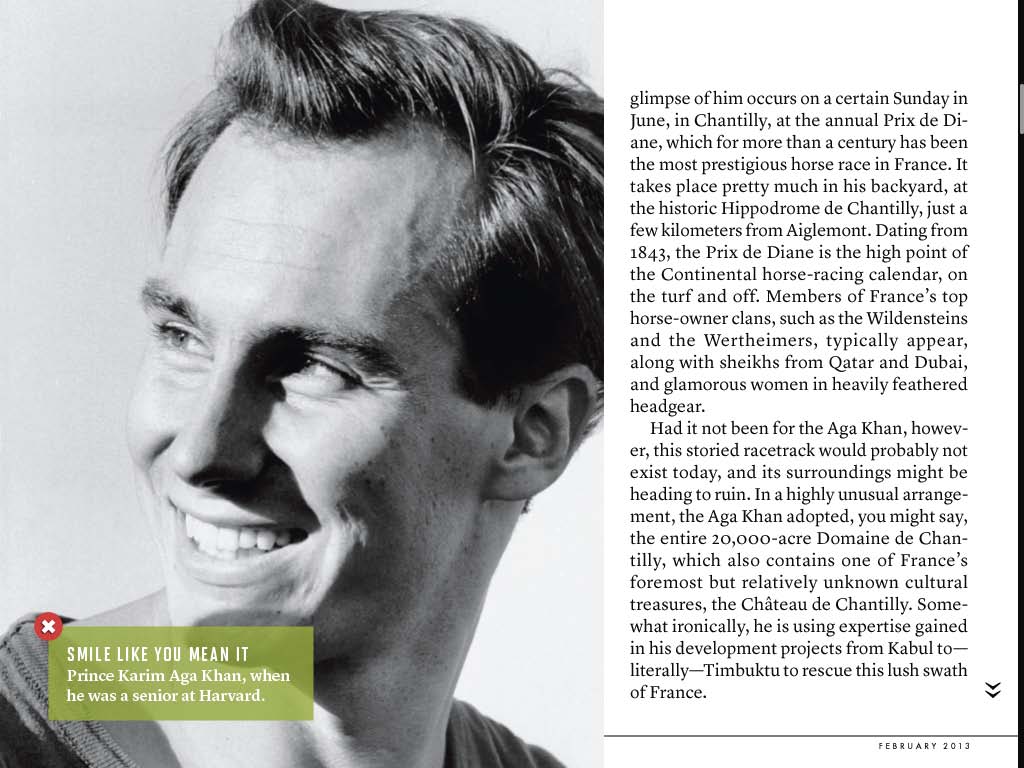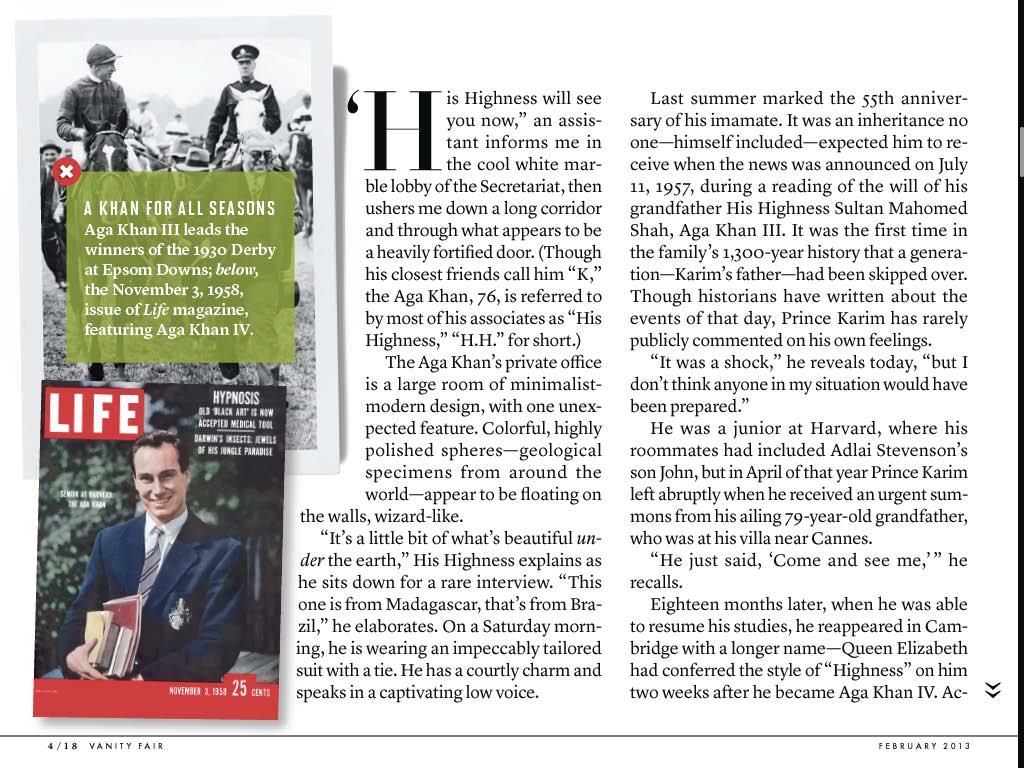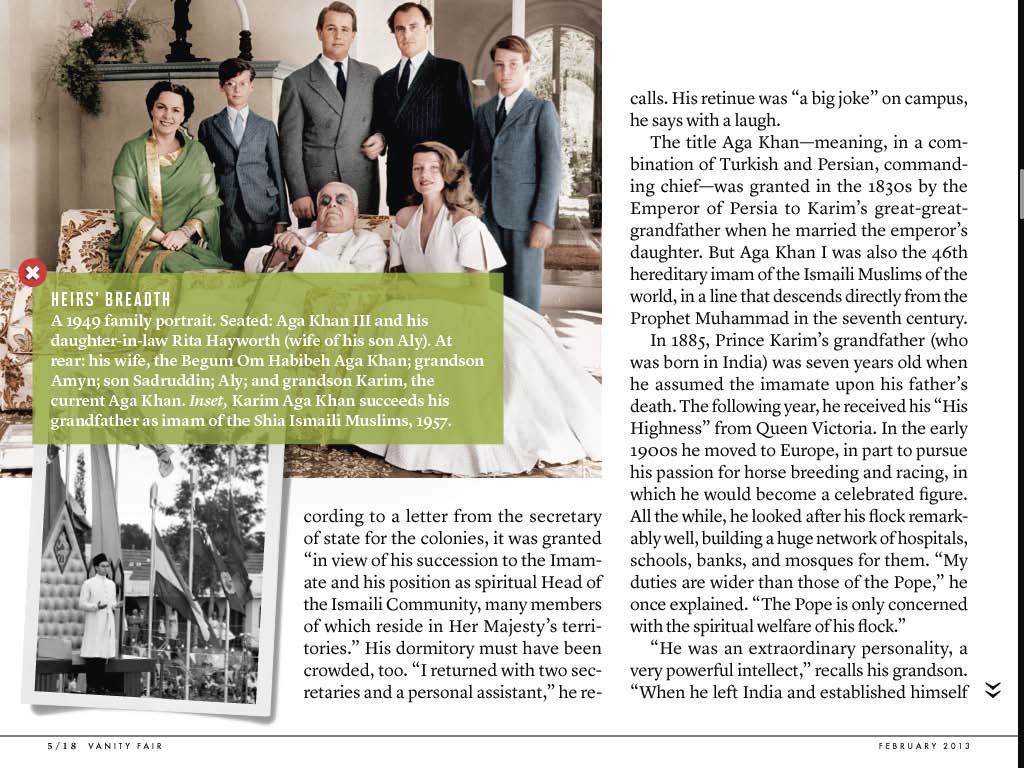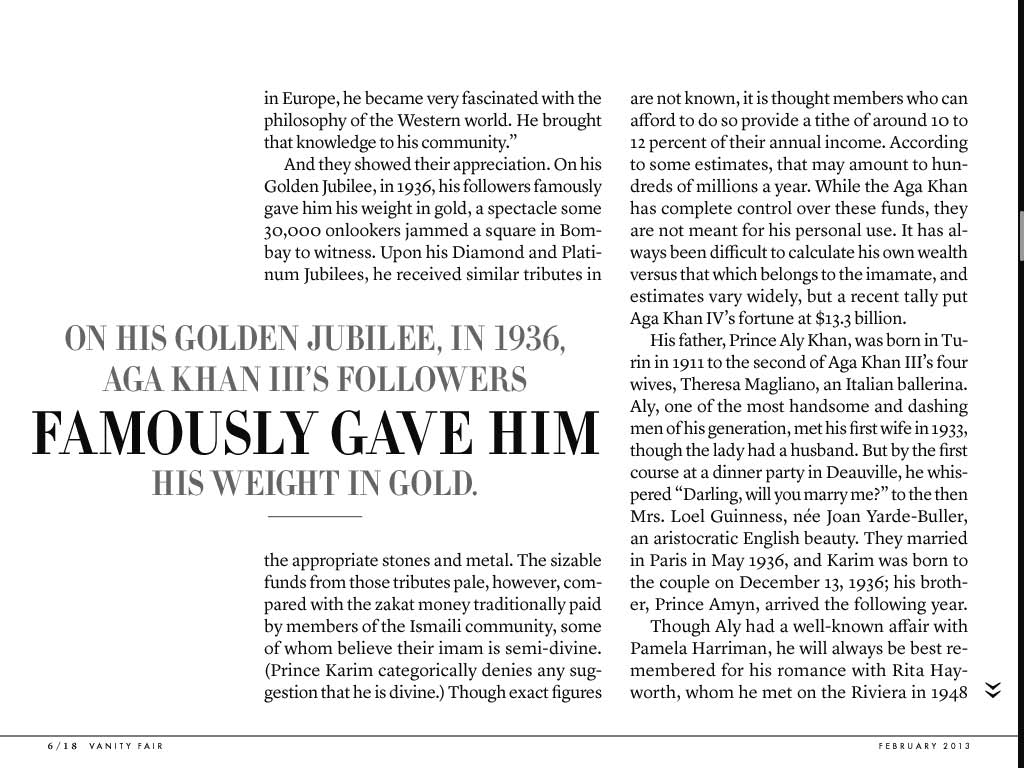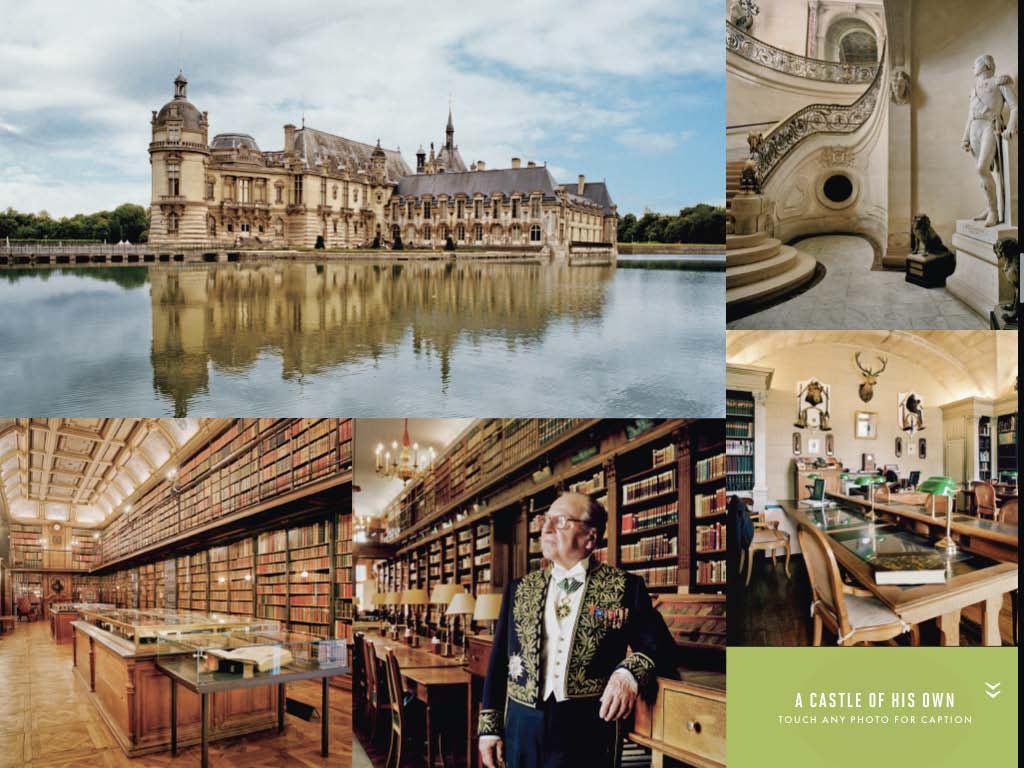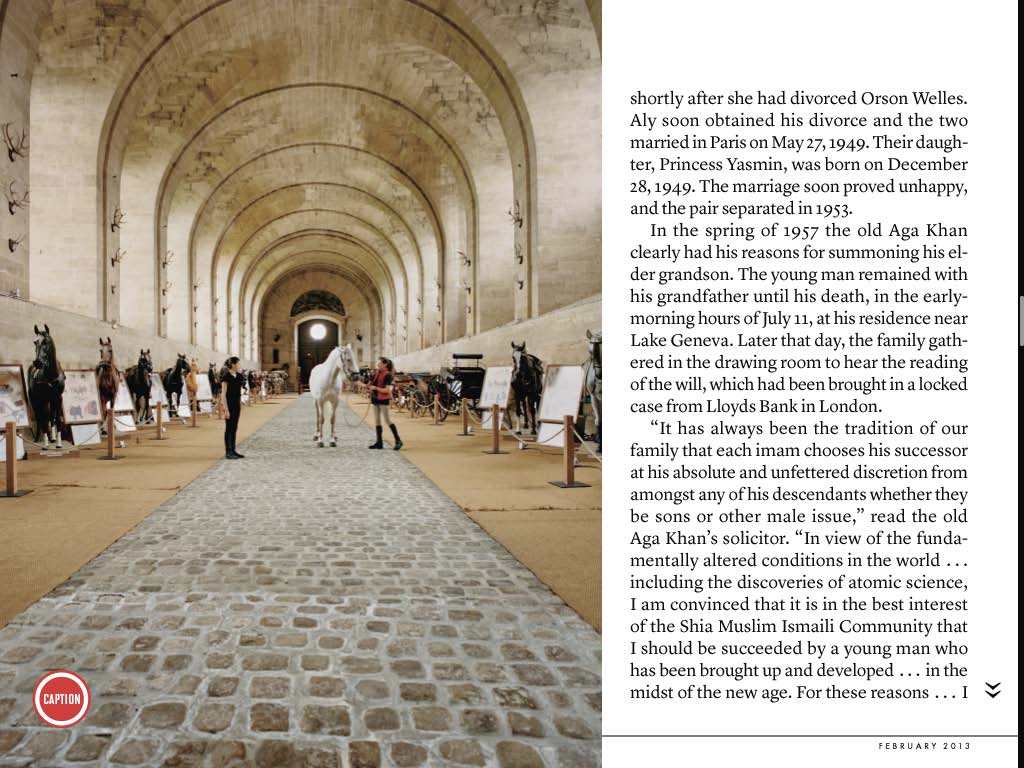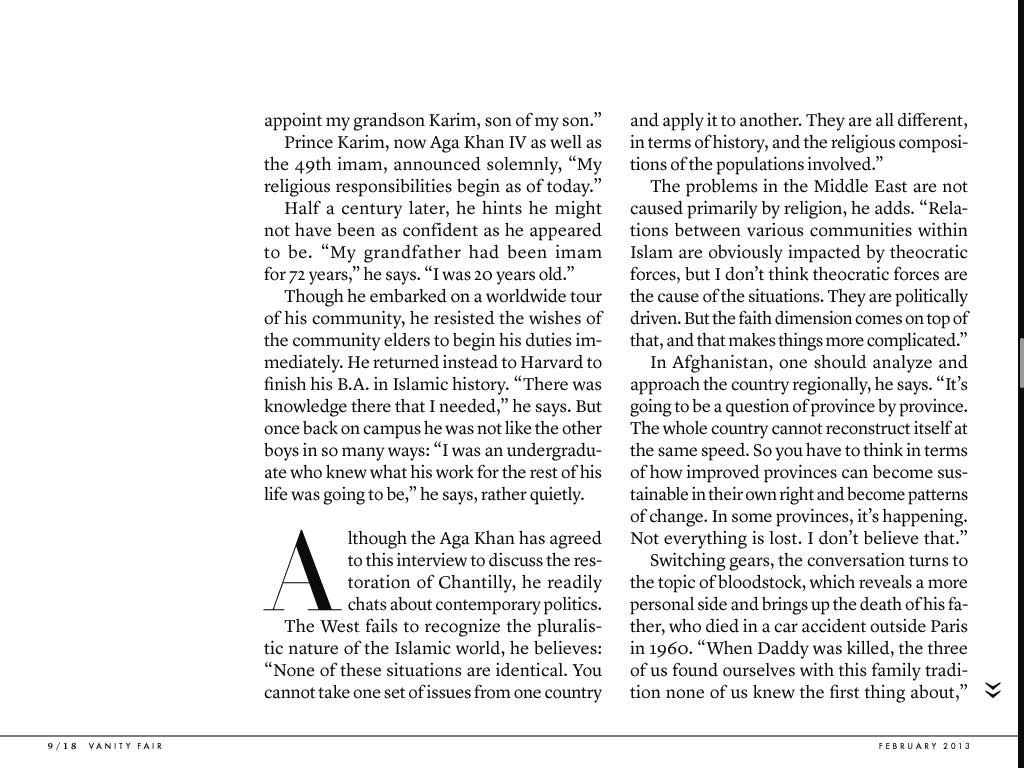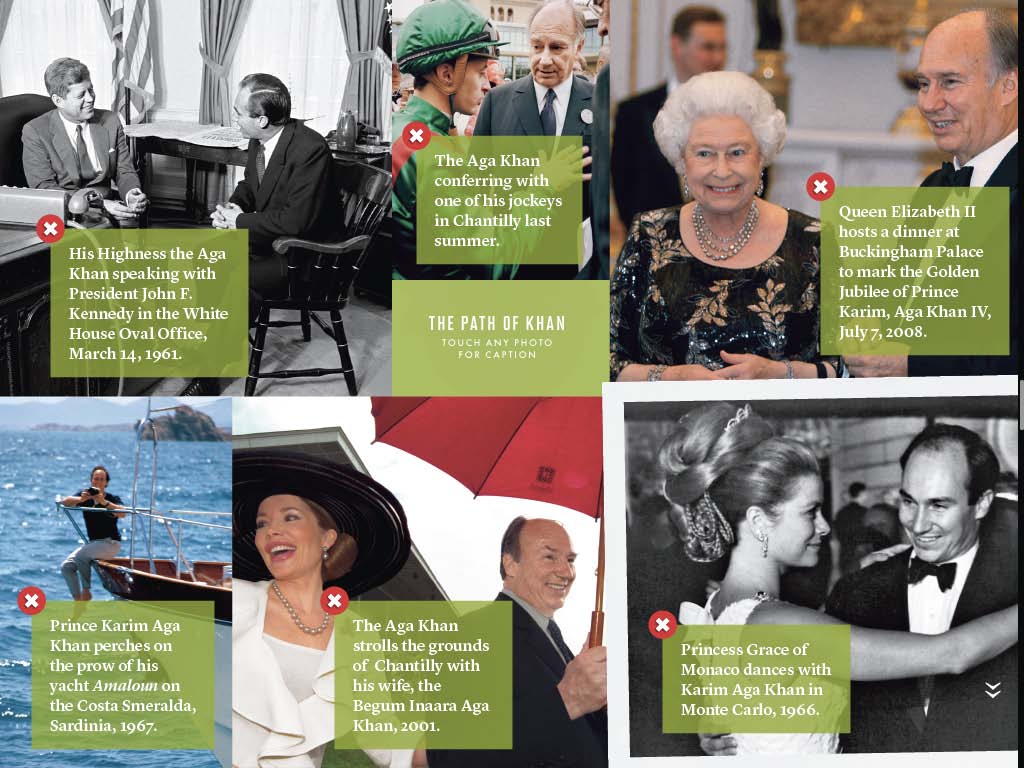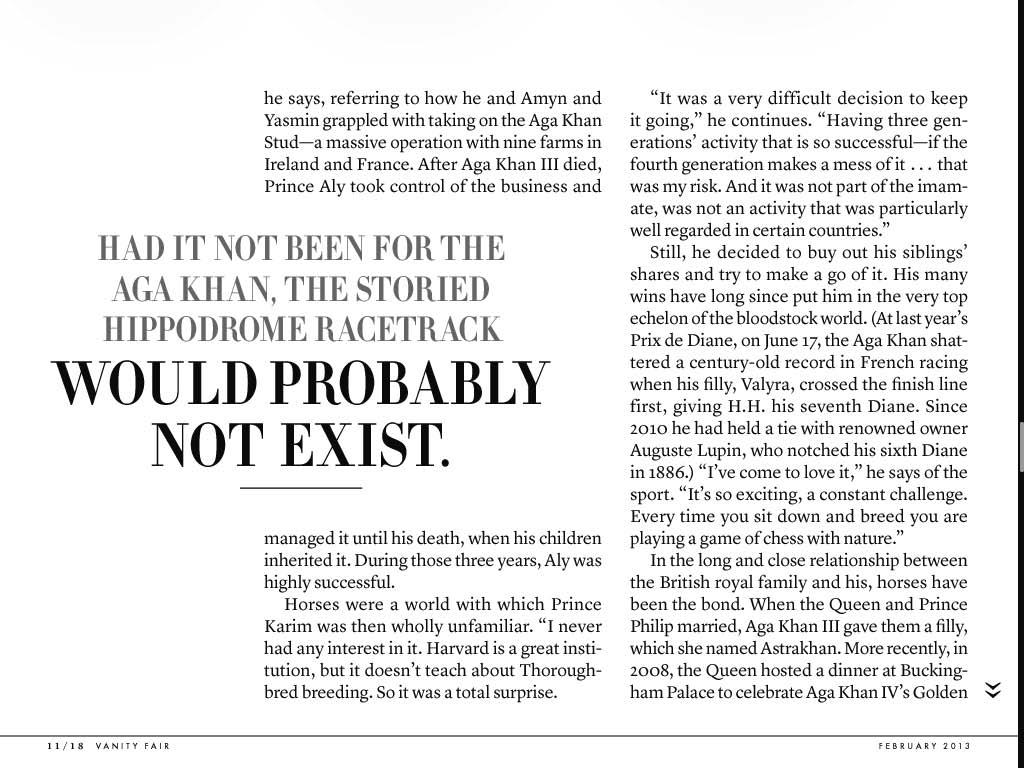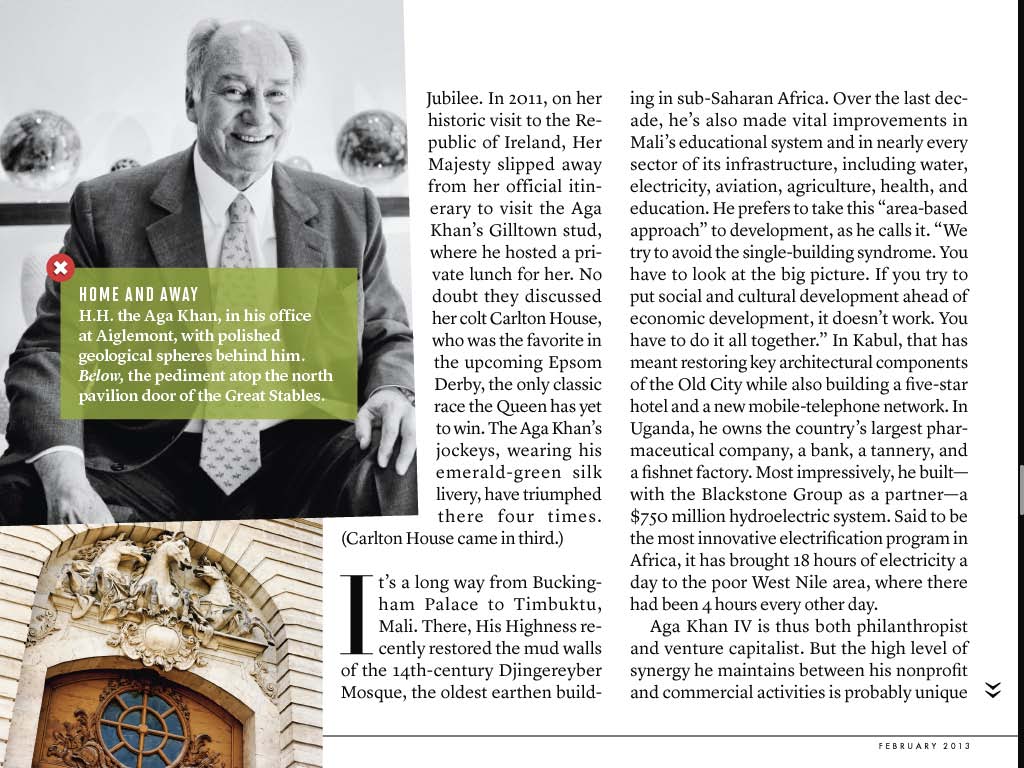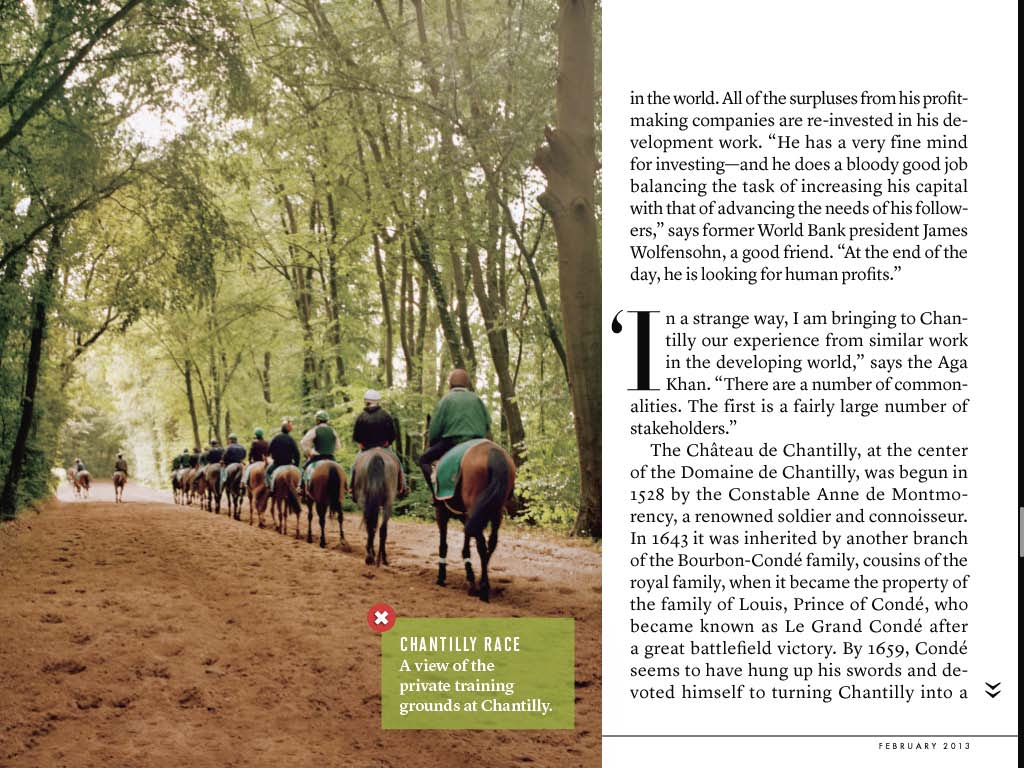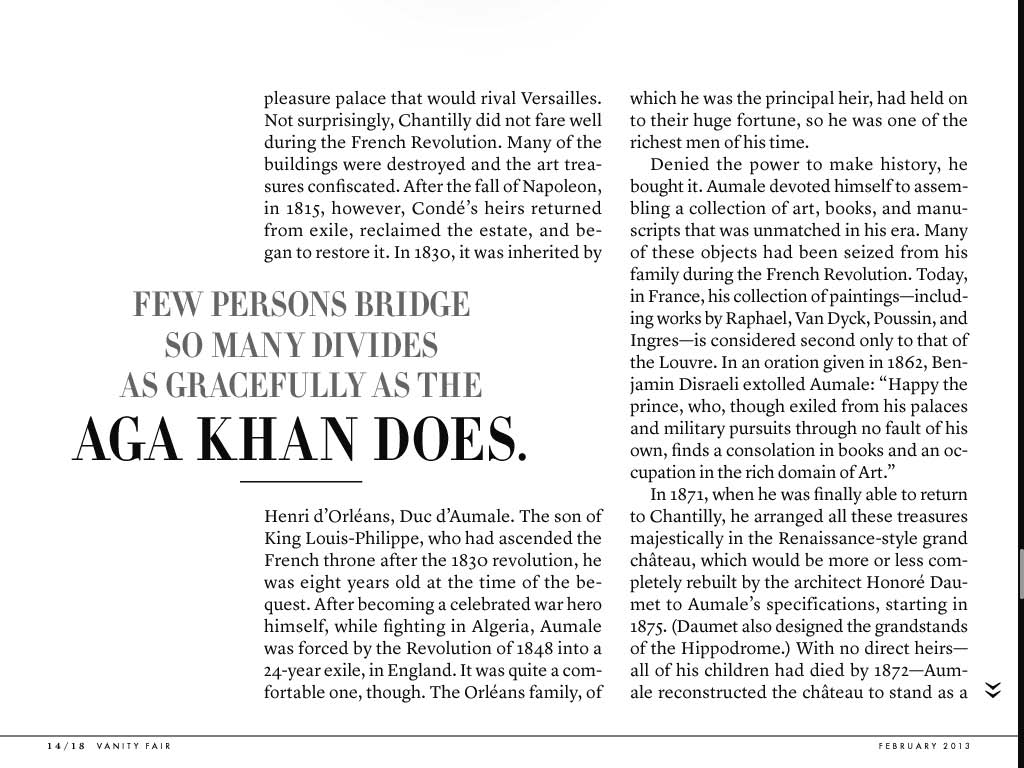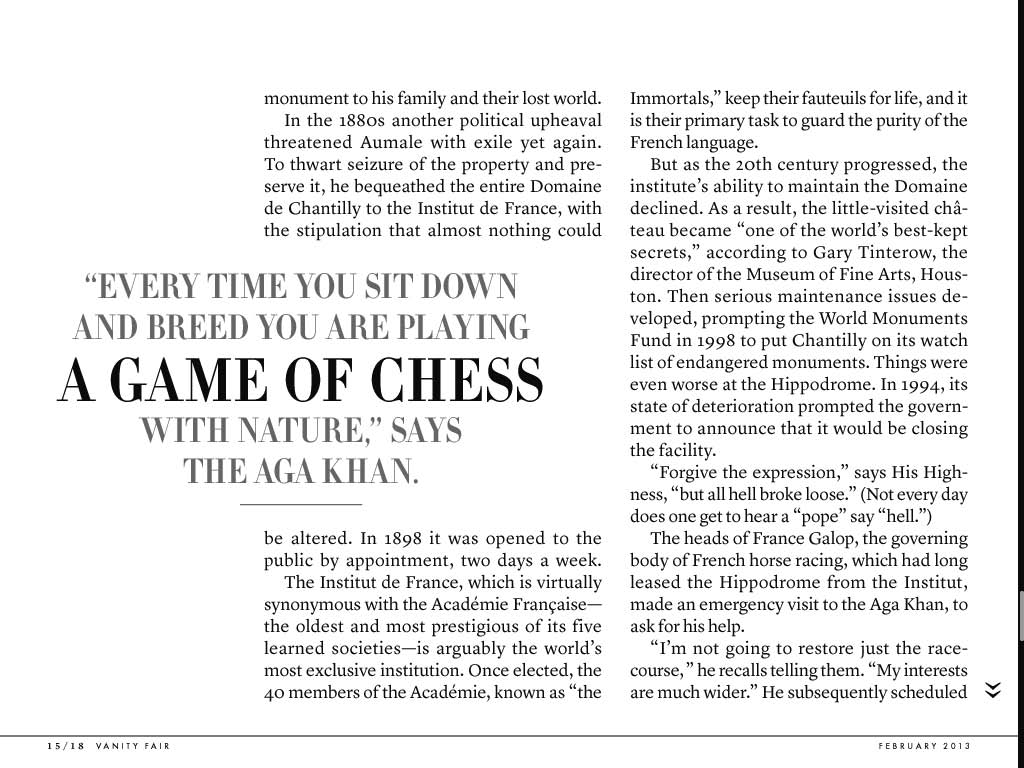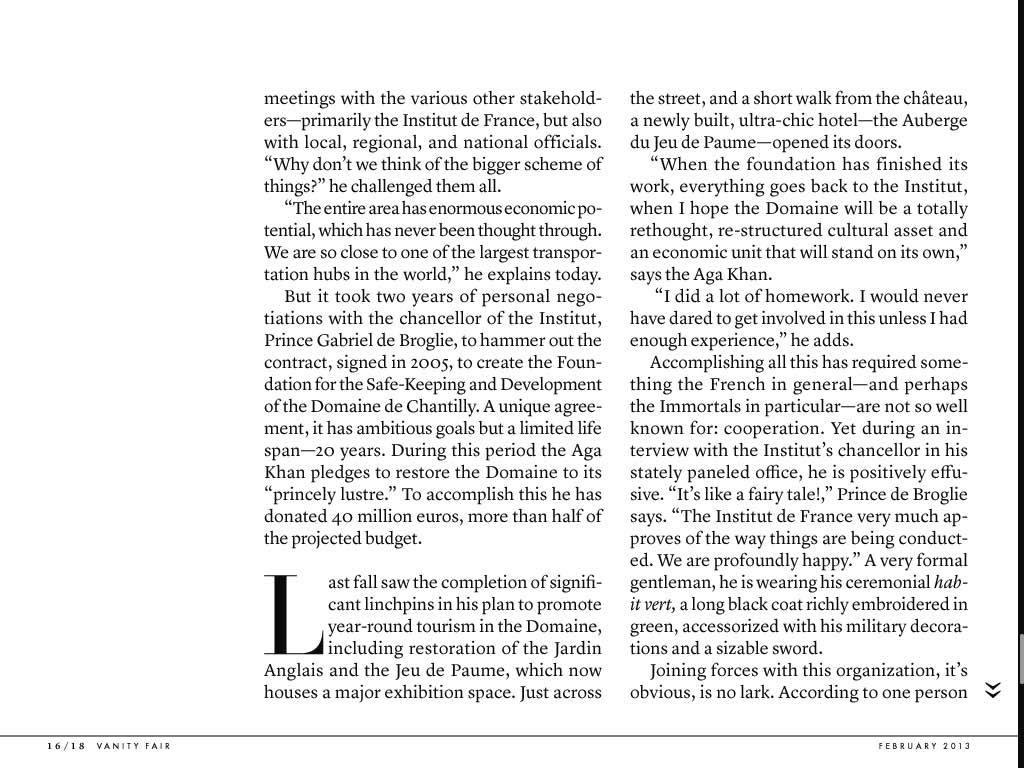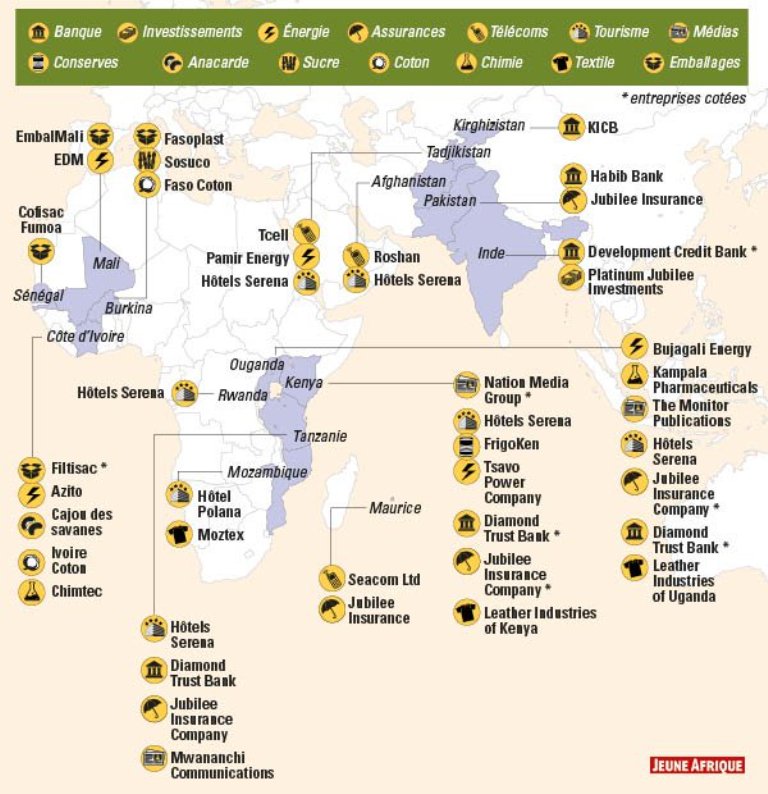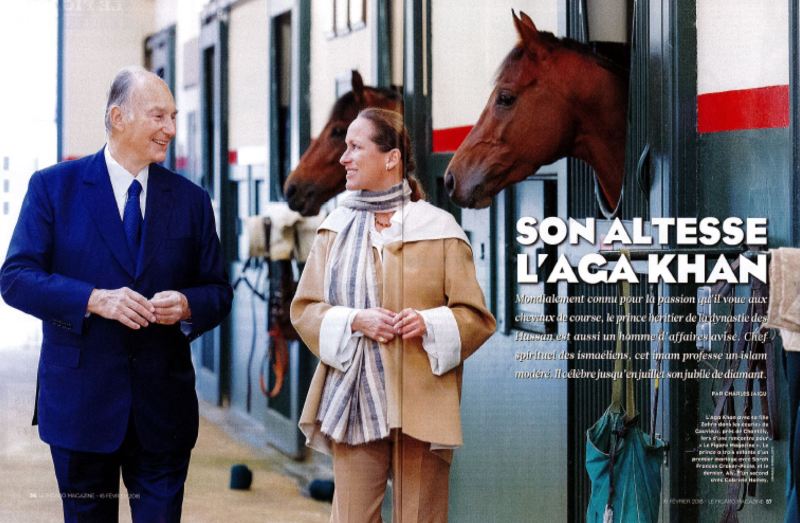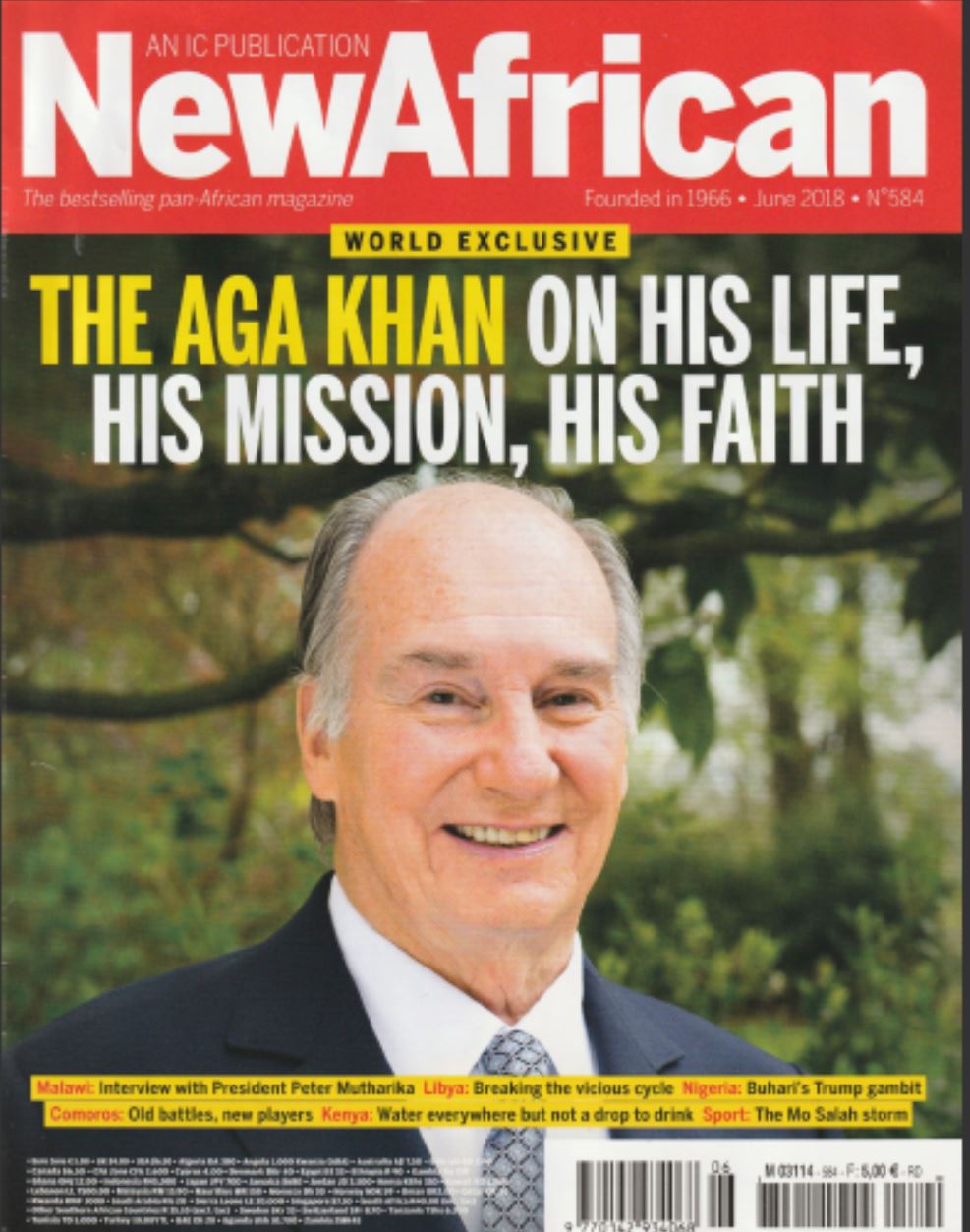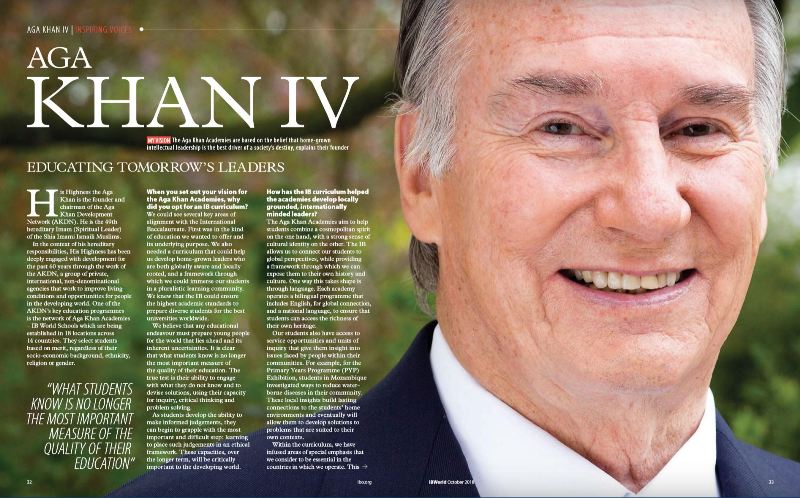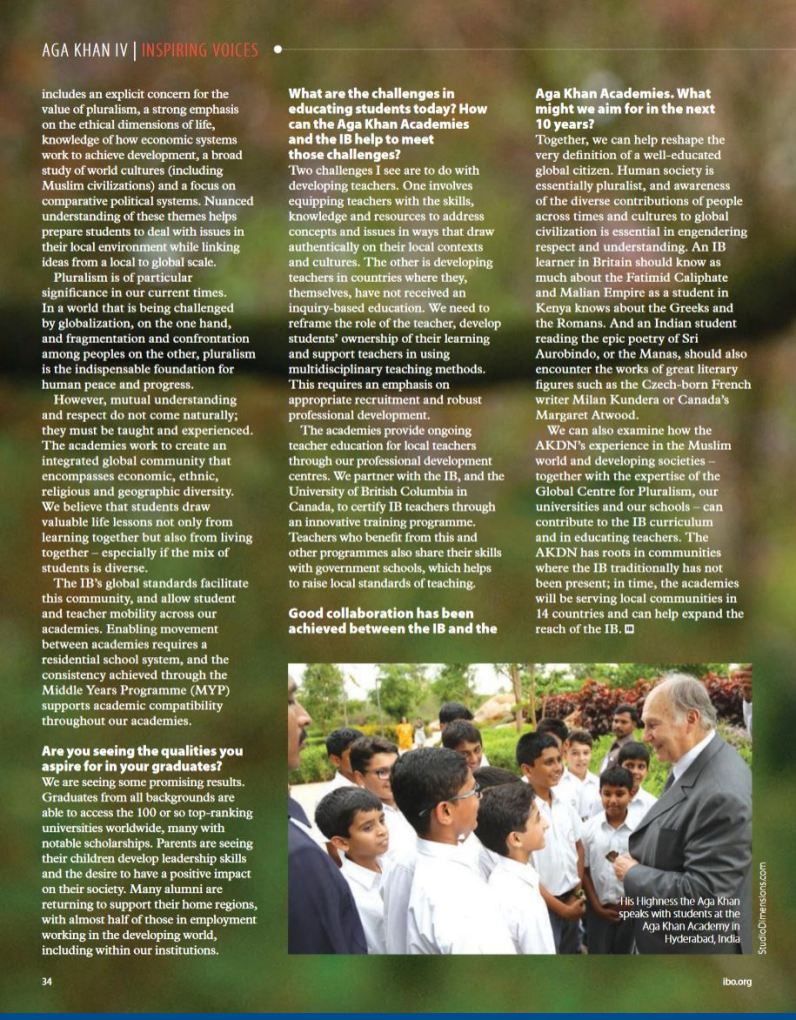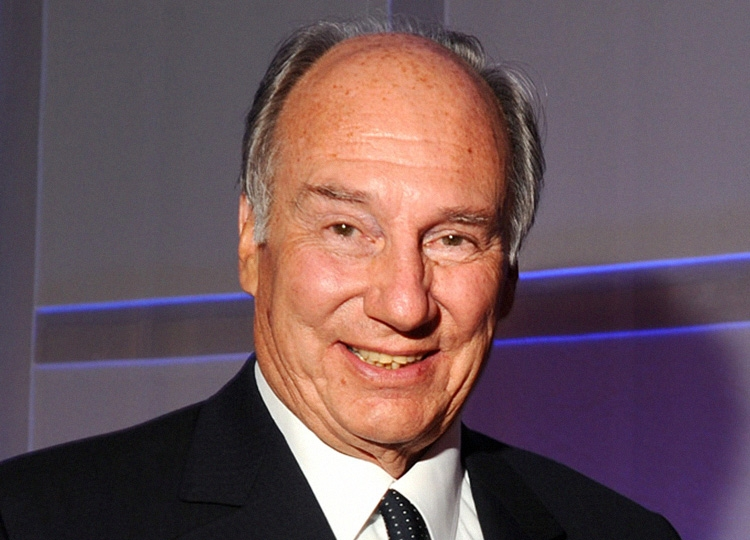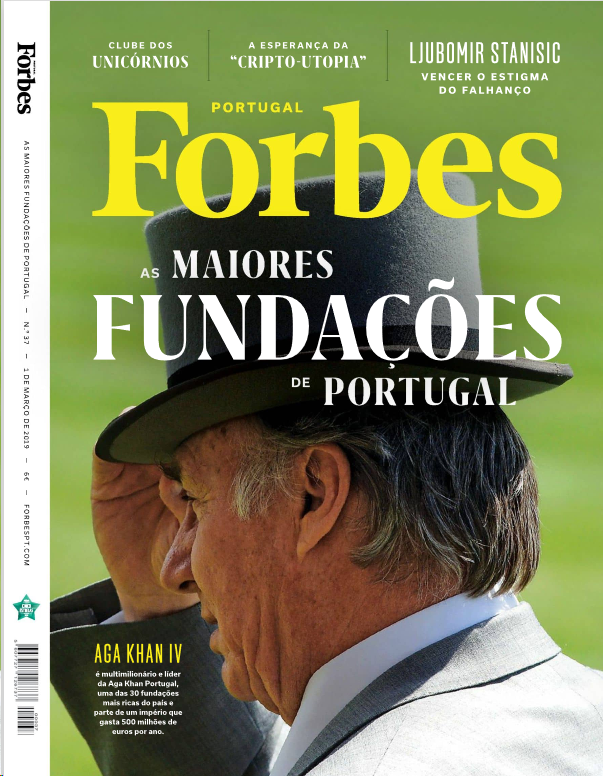http://expresso.sapo.pt/sociedade/2017- ... s-na-Terra
Photos below Portuguese text and English version by Google Translate below photos [/b]
Um deus na Terra
16.09.2017 às 9h00
FOTO CHRISTOPHER LITTLE/AKDN
Aga Khan IV descende do profeta Maomé e é o líder espiritual de 15 milhões de fiéis muçulmanos, 10 mil dos quais vivem em Portugal. É um dos homens mais ricos e mais influentes do mundo, o qual tem tentado transformar à sua maneira e à do Islão. Está prestes a estabelecer residência em Lisboa. Será o novo sr. Gulbenkian
Alexandra Carita
Alexandra Carita
É o príncipe Karim Aga Khan IV. Mas chamam-lhe Sua Alteza. O título foi-lhe atribuído por Isabel II, a rainha de Inglaterra, logo depois de Karim, aos 20 anos, assumir o cargo de imã, o 49º imã dos 15 milhões de muçulmanos xiitas ismaelitas. Há cerca de um mês, a 11 de julho, iniciou as celebrações do seu jubileu de diamante e prepara-se para deixar a região de Paris e estabelecer residência em Lisboa.
É um dos homens mais ricos do mundo, dizem as revistas estrangeiras da especialidade, que há pouco tempo situavam a sua fortuna nos quase 14 mil milhões de dólares. Mas é ao mesmo tempo líder espiritual de uma comunidade que doa ao Imamato, que ele próprio gere, cerca de 10 a 12% do que ganha. São milhões e milhões que a Rede Aga Khan para o Desenvolvimento (Aga Khan Development Network — AKDN), uma espécie de Nações Unidas privadas, como já foi descrita, põe ao serviço dos fiéis e da sociedade onde se inserem, em mais de 25 países situados maioritariamente na Ásia Central, na África Subsariana, no Médio Oriente, na Europa e na América do Norte.
Com funções múltiplas e muito além da orientação religiosa e da interpretação do Corão, Karim Aga Khan tem a seu cargo a educação cívica da comunidade, que o adula. Significa isso cuidar do seu bem-estar e guiá-los no sentido de criarem os seus próprios meios de subsistência e as suas carreiras com base nessas orientações. “Os meus deveres são bem mais latos do que os do Papa. Ele só tem de se preocupar com o bem-estar espiritual do seu rebanho”, disse um dia. O príncipe Aga Khan encaminha os seus fiéis em termos de educação e saúde, bem como de finança e economia, valores éticos e sociais. Um rol de áreas que a constituição que criou em 1986, ratificada em 1998, descreve com clareza e faz seguir em todo o mundo e em todas as comunidades através de conselhos nacionais. Portugal não é exceção. No país vivem quase 10 mil ismaelitas, sobretudo na zona da Grande Lisboa, e Aga Khan não tem deixado de investir em terras lusas com protocolos assinados em várias áreas, da ciência à cultura, passando pela educação e pela sustentabilidade.
“A assinatura do acordo histórico entre o Imamat Ismaili e a República Portuguesa para estabelecer em Portugal a sua sede é um marco histórico nos nossos 1400 anos de história. Partilhamos com Portugal os valores da tolerância na diversidade de comunidades e culturas e temos um imenso respeito pelo compromisso do país em partilhar conhecimento para a melhoria das comunidades em todo o mundo”, diz Karim Aga Khan ao Expresso.
No Paquistão, em 1970, numa visita a uma escola fundada pelo avô Aga Khan III
No Paquistão, em 1970, numa visita a uma escola fundada pelo avô Aga Khan III
FOTO CUMBER STUDIOS/AKDN
Essa é a razão por que foi aqui, no Palacete Henrique Mendonça (antiga Reitoria da Universidade Nova de Lisboa), que o príncipe decidiu criar a primeira sede física para o Imamato, que sempre funcionou através de um secretariado que acompanha o imã na sua residência mais perene, ultimamente Aiglemont, a 40 quilómetros de Paris. Um castelo luxuoso, como as outras moradias de Sua Alteza — nomeadamente na Sardenha e em Genebra —, que nos seus 40 hectares de terreno vê crescer os puros-sangue mais caros das corridas de cavalos mais prestigiantes do mundo. É a criação destes animais de pedigree, aliás, um negócio nas mãos da família há mais de um século, que oferece a Karim grande parte da sua fortuna pessoal (mas o dinheiro chega-lhe também do ramo imobiliário, que domina em todo o mundo).
São famosos os jockeys do domínio de Chantilly trajados a rigor com as camisas de seda verde e vermelha, as cores do Imamato. Como são famosas as aparições do príncipe no Prix Diane, a corrida anual que marca em França, no mês de junho, o troféu mais apetecido da modalidade. Esse ponto alto europeu das corridas de cavalos acontece num domingo, e esse é um dia sagrado para ver Aga Khan, tão raras que são as suas apresentações públicas mundanas. Sexta-feira passada, dia 1 de setembro, abriu uma exceção e apareceu em público em Almancil, no Algarve, para festejar com o amigo Francisco Pinto Balsemão o seu 80º aniversário.
O príncipe sempre foi alvo do interesse desmedido da imprensa cor de rosa e muito sobre ele se escreveu, tanto sobre a sua predileção por barcos e iates como sobre as suas pretendentes, mulheres e divórcios milionários.
Karim tem quatro filhos de dois casamentos. Em 1968, apaixonou-se pela esbelta Sally Chrichton, uma modelo alta e loira, que conheceu em Gstaad. Casou com ela no ano seguinte, e nasceram três filhos: Zahra, Rahim e Hussain. Os três trabalham hoje na Rede Aga Khan para o Desenvolvimento em cargos de relevo, desde a direção do departamento social ao sector ambiental, passando pela gestão do Fundo para o Desenvolvimento Económico. Já com os filhos criados, porém, o casamento terminou. Estávamos no ano de 1994. Logo em 1995, Karim Aga Khan IV voltou a casar, desta vez com a princesa germânica Gabriele zu Leiningen, que depois de uma curta carreira como estrela da pop trabalhava na altura como consultora da UNESCO. Cinco anos mais tarde, em 2000, nascia Aly Muhammad, que não veria os pais juntos durante muito tempo. O divórcio fez correr muita tinta e muito dinheiro e foi capa de imensos tabloides, mas não afastou o príncipe dos amores.
Em Porshniev, no Tajiquistão, em 2008, com membros da comunidade ismaelita
Em Porshniev, no Tajiquistão, em 2008, com membros da comunidade ismaelita
FOTO AKBAR HAKIM/AKDN
“Tomo todo o tipo de precauções quando saio com amigos. Aprendi a não mostrar qualquer tipo de emoção em público. Nunca me sento ao lado de uma mulher a quem a imprensa me quer associar”, disse em tempos numa entrevista. Nessa altura, ainda punha os pés fora de casa. Mas a vida ensinou-o. O correio chegou a ser-lhe violado, os funcionários entrevistados, amigos pessoais tiraram-lhe fotografias na sua própria casa e venderam-nas a revistas interessadas e até foi chantageado por telefone. Hoje e há já muito tempo que não sai. Tem uma vida recatada. Não bebe e não fuma. E dedica todo o seu tempo ao cargo que o avô paterno lhe atribuiu tinha ele 20 anos.
Estudante em Harvard, Karim ansiava por se especializar em História, na vertente de História da Religião Islâmica, em 1957, quando no início de abril recebeu uma curta intimação do avô, já com 79 anos de idade. “Vem ver-me!”, nada mais, nada menos. O jovem voou para perto de Cannes, no sul de França, onde este residia. E só voltou à universidade 18 meses depois, já como Aga Khan IV. Era a primeira vez que a hereditariedade do líder ismaelita saltava uma geração. O avô queria-o perto dele, pois pressentia a morte. Quando o seu testamento foi lido, a 11 de julho, o pânico abateu-se sobre o neto: “Foi um choque”, escreveu mais tarde. “Mas acho difícil que alguém na minha situação estivesse preparado”, adiantou numa entrevista de 2013 à revista “Vanity Fair”. A responsabilidade caía-lhe em cima, e o regresso a Harvard não passou de uma brincadeira. Karim estava fadado para liderar o povo ismaelita, e as suas funções começavam imediatamente, não se compadecendo com cursos ou cadeiras em atraso. Se é que não começaram antes. De abril até às primeiras horas do dia 11 de julho, quando o avô Sultan Mahomed Shah Aga Khan III faleceu, o jovem permaneceu a seu lado, mas nesse dia, assim que o advogado do avô chegou à casa perto do lago Léman para ler o testamento, soube o porquê de a escolha ter recaído sobre ele e não sobre o seu pai Aly.
Com o Presidente Kennedy, na Sala Oval da Casa Branca, em Washington, a 14 de março de 1961
Com o Presidente Kennedy, na Sala Oval da Casa Branca, em Washington, a 14 de março de 1961
FOTO ROBERT KNUDSEN/AKDN
“Foi sempre tradição na nossa família que cada imã escolha o seu sucessor na mais absoluta discrição entre qualquer um dos seus descendentes, sejam eles filhos ou não. De acordo com as grandes alterações do mundo, o que provocou muitas mudanças fundamentais, incluindo a descoberta da ciência atómica, estou convencido de que é do maior interesse para a comunidade ismaelita que eu seja sucedido por um jovem que foi criado e educado nos últimos anos e no centro da nova era e que trará uma nova visão da vida ao seu trabalho.” Assim justificou Aga Kahn III a escolha de Karim. No entanto, dizem as más línguas, o que ele não queria era um playboy no seu lugar.
A expressão pode ser um exagero, mas não deixa de ser várias vezes utilizada em relação a Aly Khan, o pai de Karim. Aly, o segundo filho da quarta mulher de Aga Khan III, a bailarina italiana Theresa Magliano, nascera em Turim em 1911. Tido como um dos mais interessantes e bem parecidos homens da sua geração, conheceu a sua primeira mulher era esta ainda casada. O ano era o de 1933, e ela era Loel Guinness, uma bonita aristocrata inglesa. Conta-se que na noite em que a encontrou pela primeira vez, num jantar dançante em Deauville, lhe segredou ao ouvido se queria casar com ele. O casamento viria a acontecer três anos depois, em maio, na magnífica Paris. Em dezembro desse mesmo ano, 1936, no dia 13, nascia Karim Aga Khan. Não tardaria muito a nascer o seu irmão Amyn, logo em 1937. Até onde reza a história, tudo bem. Mas é no pós-guerra que o galã Aly dá mais que falar. O seu romance com a estrela de Hollywood Rita Hayworth foi o apogeu de uma vida de grandes aventuras. Conheceu-a em 1948, em plena Riviera francesa, tinha esta acabado de se divorciar do cineasta Orson Welles e vinha substituir Pamela Harriman na vida do príncipe. Chegaram a casar, também em maio, a 27, e também em Paris, em 1949, e tiveram uma filha, a princesa Yasmin. Mas não foram felizes para sempre e separaram-se quatro anos mais tarde. E, em 1960, Aly Khan morria num acidente de viação, às portas de Paris.
Com Nelson Mandela, já Presidente da África do Sul, em Moçambique, em agosto de 1998
Com Nelson Mandela, já Presidente da África do Sul, em Moçambique, em agosto de 1998
FOTO GARY OTTE/AKDN
“As minhas responsabilidades religiosas começam a partir de hoje”, declarou Karim a seguir à leitura do testamento, que chegou à Suíça numa caixa fechada enviada pelo Lloyds Bank de Londres. Contudo, nos primeiros sete anos do seu Imamato, ouviu e seguiu os conselhos da esposa do avô, como deixara também escrito Aga Khan III. “Durante a noite, a minha vida mudou completamente. Acordei com responsabilidades sérias para com milhões de seres humanos”, explicou numa entrevista dada em agosto de 1964. E, já em 2013, reconhecia que talvez não estivesse tão confiante assim. Na verdade, o avô “governara” durante 72 anos, ele tinha 20!
Não esqueceu, porém, que Aga Khan III iniciara as suas funções com sete anos apenas, numa Índia completamente britânica, antes de se mudar para a Europa, já depois de ter recebido da Rainha Vitória o mesmo título de Sua Alteza, corria o ano de 1886. Este cidadão britânico, tal como agora o neto, pelejou por melhores condições de vida para a sua comunidade e para os que lhe estavam próximos e não deixou de construir uma enorme rede de hospitais, escolas, bancos, mesquitas. No entanto, foi quando, já no início do século XX, chegou ao Velho Continente que tomou consciência de toda uma outra filosofia de vida, a de um mundo moderno que quis também doar aos seus fiéis. Com uma personalidade fora do comum e uma capacidade intelectual forte, passou a mensagem à sua comunidade. Entre os ismaelitas portugueses, há quem ainda se lembre bem de quando Aga Khan III disse aos seus que deveriam aprender inglês, “era a Europa um continente francófono”, ou quando chamou pela primeira vez a atenção para a igualdade de género. “Se tiverem dois filhos, um homem e uma mulher, e se só puderem dar educação a um deles, privilegiem as mulheres”, relembra Nazim Ahmad, representante diplomático do Imamat Ismaili em Portugal. A ideia era não só fazê-las evoluir geracionalmente de forma rápida como preservar a educação — a mulher como educadora e mãe é a sua principal transmissora. Adorado como ninguém, Aga Khan III viu o seu peso ser-lhe doado em ouro no seu Jubileu de Ouro, em 1936, na cidade de Bombaim, e depois em diamantes e platina, nos jubileus correspondentes.
Com a então primeira-ministra britânica Margaret Thatcher, na inauguração do Centro Ismaili em Londres, em 1985
Com a então primeira-ministra britânica Margaret Thatcher, na inauguração do Centro Ismaili em Londres, em 1985
FOTO DEREK ROWE/AKDN
O mesmo não aconteceu a Karim Aga Khan IV. Mas os seus jubileus têm sido marcados por donativos muitíssimo substanciais para as obras da Rede Aga Khan para o Desenvolvimento, que fundou há mais de cinco décadas. Este ano, em que se iniciam as comemorações do seu Jubileu de Diamante, as somas doadas pelos fiéis não foram contabilizadas, mas estima-se que sejam largas centenas de milhões. “Não se espera que um imã se retire da vida do dia a dia. Pelo contrário, dele é esperado que proteja a sua comunidade e contribua para a melhoria da sua qualidade de vida. Assim, a noção da divisão entre a fé e o mundo é estranha para o Islão. O Imamato não divide mundo e fé. E muito poucos compreendem isso fora do Islão. No Ocidente, os vossos sistemas financeiros são todos construídos segundo essa divisão”, explica o príncipe noutra entrevista, justificando ao mesmo tempo a preocupação constante com o bem-estar dos seus fiéis. A mesma afirmação serve ainda para fundamentar a existência de tanta riqueza e criação dela tanto na AKDN como na vida ativa de cada membro da comunidade, que se esforça sempre por uma vida melhor e menos carenciada.
No Paquistão, com os habitantes de Jaglot, perto de Gilgit, em maio de 1983
No Paquistão, com os habitantes de Jaglot, perto de Gilgit, em maio de 1983
FOTO CHRISTOPHER LITTLE/AKDN
Todas as diretrizes de Sua Alteza, de resto, vão nesse sentido. Se até 1995 os objetivos eram os de obter uma educação superior para o maior número possível de ismaelitas, hoje os mesmos objetivos, no que respeita ao campo educacional, são os de obter ensino superior de excelência para todos. Não é por acaso que Aga Khan tem vindo a criar as suas próprias instituições, desde as aAcademias às universidades (Universidade Aga Khan e Universidade da Ásia Central), abertas a toda a sociedade. Além delas, porém, uma nova diretriz toma conta das preocupações do príncipe: a educação parental, ou seja, aquela que tem início no ventre e se prolonga até aos 5 anos. É nessa idade que as crianças recebem mais estímulos intelectuais, cognitivos e motores, tornando-se essencial no seu desenvolvimento. Outra das suas prioridades é neste momento uma chamada de atenção para a saúde no campo das doenças psiquiátricas, neurológicas e oncológicas, além da normal medição dos parâmetros de saúde que sugere a todos os fiéis. Esta é só uma amostra do tipo de normas que Sua Alteza dita, muitas vezes em campanhas de sensibilização, mas que não deixam de ser levadas à letra. Já num raio de ação vasto, as prerrogativas para os próximos 10 anos incluem ainda o combate à pobreza e a mobilização dos jovens para a cidadania (construtiva, ativa e consciente). Para que se tenha uma ideia da precisão destas orientações, fique a saber-se que são impressos manuais escolares em Londres, no Instituto de Estudos Ismailis, que estabelecem os currículos muito bem fundamentados academicamente, depois traduzidos nas várias línguas das comunidades e que significam uma estandardização perfeita da comunidade a nível mundial. Em Portugal, decorrem atualmente, por exemplo, cursos de orientação de carreiras para alunos do 8º ano. É-lhes ensinado até como poupar para o acesso a escolas de nível elevado, onde as propinas são caras. A ideia é que nem financeiramente lhes esteja limitado o acesso.
Na Muralha da China, em outubro de 1981
Na Muralha da China, em outubro de 1981
FOTO GARY OTTE/AKDN
No entanto, Aga Khan IV trabalha diariamente a uma esfera global. O seu lema é o do pluralismo de culturas, credos e ideologias, e acredita que, aplicando estas noções básicas de ética, a sociedade pode evoluir, ajudando-se mutuamente. Acredita na solidariedade e na cultura do voluntariado. É nessa perspetiva que cria a AKDN, a operar em 30 países diferentes e empregando mais de 80 mil pessoas. Cinco centrais elétricas, companhias aéreas, empresas farmacêuticas, bancos, seguradoras, cadeias de hotéis de luxo, empresas de comunicação perfazem uma centena de empresas detidas pela Rede, que utiliza os seus lucros — cerca de 3,5 mil milhões de euros anuais — em benefícios das populações nos domínios do desenvolvimento social e económico e também cultural. Em pratos limpos, isto significa a criação e manutenção de fundos de crédito, de escolas e hospitais e ainda muitos postos de trabalho e micro/macroeconomias em países tão díspares como o Paquistão e o Afeganistão, onde ofereceram escolaridade às mulheres, por exemplo, até à Tanzânia, ao Mali, ao Burkina Faso, ao Uganda ou à Síria, à Índia, à Malásia e a Moçambique.
Com o Presidente Cavaco Silva, em junho de 2014
Com o Presidente Cavaco Silva, em junho de 2014
FOTO JOSÉ CARIA/AKDN
Karim Aga Khan recusa, porém, o epíteto de filantropo ou de praticante da caridade. Para o 49º imã, aquilo que faz é parte integrante do seu mandato e da sua responsabilidade de melhorar a qualidade de vida de todos os seus semelhantes de acordo com a ética do Islão. Pode parecer estranho ou ser de difícil compreensão para um ocidental a junção de dois mundos tão distintos: o espiritual e o material. É por isso que chamam a Sua Alteza com frequência capitalista crente. Ele explica-se de outra forma: “Todos nós já vimos exemplos da criatura mais maravilhosa de Deus, a pessoa, seja numa posição governamental, nos negócios ou numa agência de desenvolvimento privada, inspirada a contribuir generosamente de si próprio, a ir além dos requisitos mecânicos de uma tarefa. Tais homens e mulheres, remunerados ou não, expressam o espírito voluntário, literalmente a vontade de criar um produto melhor, uma clínica mais solidária e eficaz. O seu espírito, gerando novas ideias, resistindo ao desânimo e exigindo resultados, anima o coração de toda a sociedade eficaz.” É esse o seu credo, a sua crença mais profunda e a sua interpretação do Islão.
Um Islão muito especial. Aga Khan IV, o imã hereditário dos muçulmanos xiitas ismaelitas, é descendente direto do profeta Maomé, o último profeta enviado por Deus à Humanidade e aquele que revelou o Sagrado Alcorão. Acreditam os xiitas ismaelitas que, depois da morte de Maomé, Ali, o seu primo e genro, se tornou o primeiro imã, o primeiro guia espiritual da comunidade muçulmana, e que essa orientação hereditária continua através dos tempos. Ao longo de 14 séculos de história, têm assim seguido os imãs hereditários descendentes de Ali e de Fátima, filha do profeta Maomé.
Nessa qualidade, Karim calcorreia o mundo praticamente de lés a lés. Encontra-se com altos dignitários, chefes de Estado, líderes religiosos, políticos, embaixadores, homens de negócios, mas também gente humilde, carenciada, professores, médicos, populações inteiras... Nas reuniões constantes, dizem, é sempre um diplomata. Um diplomata no discurso mas um soberano nas decisões, conseguindo levar a sua avante em praticamente todas as circunstâncias, afiançam os que com ele têm trabalhado. Aga Khan participa ativamente em todas as iniciativas da AKDN, e não há embaixador seu que não seja por si nomeado, desde os seus mais próximos colaboradores aos “ministros” tutelares de cada comunidade, nomeados por três anos para levar a cabo as suas orientações em cada nação. Escolhe os terrenos para a construção das escolas, dos centros ismaelitas (seis em todo o mundo, sendo o de Lisboa o terceiro a ser criado), dos hospitais, das creches, dos museus, de tudo... Designa os arquitetos, acompanha a obra, de sapatos sempre — as galochas não lhe assentam bem, acredita, conta um colaborador seu. E talvez seja por isso que as solas dos sapatos se gastam literalmente até que lhe chamem a atenção para trocar de calçado, como relata a sua irmã. Ou talvez seja pela falta de tempo.
Cerimónia. Sua Alteza, Aga Khan, dirige-se aos membros da comunidade ismaelita no vale de Bartang, no Tajiquistão, a 25 de setembro de 1998
Cerimónia. Sua Alteza, Aga Khan, dirige-se aos membros da comunidade ismaelita no vale de Bartang, no Tajiquistão, a 25 de setembro de 1998
FOTO ZAHUR RAMJI/ AKDN
Sua Alteza não para um instante. Verdadeiro workaholic, vive praticamente dentro do seu avião privado, que comprou para economizar viagens e tempo — voa entre 450 a 600 horas por ano, o equivalente a dois meses de trabalho. Com ele vai muito pouca gente: dois assistentes e uma secretária chegam-lhe para fazer todo o trabalho. “Desde que deixei Harvard que viajo todos os anos pela comunidade espalhada pelo mundo. Quatro ou cinco viagens às populações, dependendo de onde há mais problemas e da urgência de eu lá estar ou não. Geralmente, são visitas a escolas e a hospitais, a centros desportivos ou a mesquitas, durante a manhã, e reuniões e encontros com líderes para planear o desenvolvimento futuro da comunidade, mais tarde. E devo dizer que estar ali por inteiro é muito, muito pesado, até para quem acompanha este tipo de digressões”, explicava numa entrevista de 1970. Vinte anos depois, em 1994, a sua vida não tinha mudado, afirmava ao “Paris Match”. Continuava a levantar-se às 6h da manhã e a trabalhar praticamente sozinho até às 10h. Depois, até ao meio-dia fazia o ponto da situação com o seu secretariado, e as reuniões começavam. Almoçava, e o ritmo mantinha-se intenso, prolongando-se muitas vezes noite dentro. Nessa altura, ainda se queixava de não poder sair para visitar amigos à noite, devido ao trabalho que o esperava no dia seguinte, logo cedo. Hoje, aos 80 anos de idade, não. A sua agenda continua lotada e ele a não delegar muita coisa nos seus colaboradores, mas queixas sobre falta de tempo livre não há. Nem sobre falta de nada.
De facto, a Karim Aga Khan IV não lhe falta nada. A sumptuosidade e o luxo conhece-os de cor. Trata por tu os bens materiais que quiser. No entanto, humilde por natureza, como conta o seu embaixador em Portugal, é mesmo conhecido entre os seus como forreta. E desde sempre. É o seu colega de quarto de Harvard o primeiro a falar, mas seguem-se-lhe a mãe, a irmã e os amigos. Não compra nada, dizem, nem um par de sapatos, nem um fato novo, só gravatas, todas iguais. E se tivesse, ou pudesse, deslocar-se sozinho, escolheria os transportes públicos e pouparia no carro, no seguro e na gasolina.
Não só de pão vive o homem, talvez respondesse se não fosse muçulmano. A verdade é que, introspetivo, Aga Khan carrega com ele um fardo que nunca fez transparecer, pesada herança e destino traçado, um mundo de gente que o segue e um novo mundo a construir. O que tem feito sempre e sempre lhe foi reconhecido.
Os milhões de Aga Khan em Portugal
LISBOA. O 49º imã escolheu Portugal para instalar a sede do seu Imamato e Lisboa para residir
FOTO AKDN
“Os olhos do mundo islâmico estão em Portugal. O país passou uma mensagem de pluralismo cultural e de abertura social única. O impacto vai ser enorme. A começar pelo investimento, que nos últimos 17/18 meses já andou na ordem dos milhões de euros só no ramo imobiliário e que pode chegar a valores astronómicos.” É assim que os representantes da comunidade ismaelita portuguesa reagem ao estabelecimento da sede do Imamato em Lisboa. Nazim Ahmad, embaixador do Imamato, Rahim Kassam, diretor executivo, Rahim Firozali, presidente do Conselho Nacional, e Karim Merali, administrador da Fundação Aga Khan Portugal, acreditam que o sinal dado pela República Portuguesa vai ao encontro da “ética cosmopolita” defendida pelo seu imã, Sua Alteza, o príncipe Karim Aga Khan IV. E não têm dúvidas de que o país vai estar no centro do mundo, depois de mais de quatro décadas no coração do seu líder. O anúncio foi feito em junho de 2015, logo depois de assinado um acordo com a República Portuguesa para a instalação da sede do Imamat Ismaili, e desde aí as expectativas são muitas, mas a emoção é ainda maior. Os ismaelitas portugueses olham para o acontecimento com júbilo e quase agradecem por viverem em solo nacional.
Foi o 25 de Abril que trouxe para Portugal a esmagadora maioria desses ismaelitas, hoje entre 8 a 10 mil no total da população portuguesa. E com eles recaiu sobre o país a atenção de Sua Alteza, o príncipe Aga Khan, que em 1983 fazia abrir em Lisboa uma agência da Fundação Aga Khan. Situada na Lapa, dedicou-se desde logo ao desenvolvimento social e à inclusão económica da população mais vulnerável e mais carenciada. A sua ação ao longo dos anos, contudo, especializou-se no apoio à educação e no desenvolvimento da infância, bem como no suporte do bem-estar da classe sénior. Mas desde 2004 o Programa Comunitário Urbano K’Cidade tem implementado, na Grande Lisboa, processos de trabalho que garantem a sustentabilidade das comunidades a longo prazo. Em 1996, a ligação da Fundação Aga Khan a Portugal estreitou laços com a constituição da mesma como uma fundação portuguesa por decreto-lei. Na mesma data, a construção do Centro Ismaili, nas Laranjeiras, também em Lisboa, trouxe por várias vezes Sua Alteza ao país. Foi Aga Khan IV quem escolheu o terreno onde este haveria de crescer e quem ditou a sua arquitetura. Como é ele quem nomeia os ministros que ali se reúnem em Conselho Nacional e que gerem e determinam as atividades e prioridades da comunidade ismaelita portuguesa. De resto, as atividades no país operam no âmbito dos acordos estabelecidos entre o Imamat e Portugal, em particular o Protocolo de Cooperação com o Governo de Portugal, assinado em 2005, o Memorando de Entendimento com o Ministério dos Negócios Estrangeiros, de 2008, o Acordo Internacional com a República Portuguesa, de 2009, e o Acordo com a República Portuguesa para o Estabelecimento da Sede do Imamat Ismaili em Portugal, em 2015.
“Em Portugal, sempre me senti em casa. Agora e em especial desde a assinatura, em 2015, de um acordo histórico entre o Imamat Ismaili e a República Portuguesa para o estabelecimento do acordo de sede, um marco importante nos 1400 anos de história do Imamat Ismaili. É o culminar da nossa relação longa e profunda em Portugal — uma relação que agora será ainda mais aprofundada”, diz Aga Khan IV no seu discurso de doutoramento honoris causa, que recebeu na Universidade Nova de Lisboa no passado dia 20 de julho. Esse aprofundamento da relação já começou com a assinatura do acordo de cooperação com o Ministério da Ciência, Tecnologia e Educação Superior, no valor de 10 milhões de euros, em maio do ano passado, com a doação de 200 mil euros ao Museu Nacional de Arte Antiga para a aquisição do quadro de Domingos Sequeira “Adoração dos Magos”, ou com a contribuição de 500 mil euros para as vítimas do incêndio de Pedrógão Grande. Haverá muito mais, nomeadamente o investimento de 10 milhões de euros na criação de uma Academia Aga Khan na área da Grande Lisboa, cuja compra do terreno para a sua construção está por um fio. O acordo com a Câmara Municipal de Cascais para estabelecer a academia em Birre foi rompido à última hora. Os terrenos em causa estavam protegidos pelo Plano Diretor Municipal (eram terrenos agrícolas), mas, tendo em conta o propósito da fundação, a autarquia avançou com uma alteração ao PDM. O município de Cascais, a fundação Aga Khan e dono do terreno, o fundo imobiliário Lusofundo, chegaram mesmo a assinar um memorando de entendimento em 2014. Só que pelo caminho a fundação recuou na ideia. O proprietário do terreno não. A fundação Aga Khan declara, no entanto, que a “desistência ficou a dever-se ao facto de, a dada altura do processo, se ter apercebido de que uma parte das forças vivas locais não apoiava qualquer tipo de construção naquele local”. Também ainda por conhecer está a residência do príncipe em Lisboa. Das várias hipóteses que já lhe foram apresentadas, falta-lhe escolher a que mais lhe agrada. Dinheiro não é problema, como não foi para comprar o Palacete Henrique Mendonça (antiga Reitoria da Universidade Nova de Lisboa), onde se vai instalar a sede, por 12 milhões de euros.
“O acordo para o estabelecimento da sede do Imamat Ismaili em Portugal não embaraça o Governo português e não embaraça o imã. É como se diz na gíria um win win, ou seja, é extraordinariamente bom para o Estado e muito bom para o Imamat”, diz ao Expresso Nazim Ahmad, que acompanhou as negociações desde o início. “O entendimento foi muito franco e aberto, tudo decorreu com transparência, frontalidade e amizade”, avança ainda. “A consciência social e ética de Sua Alteza contribuiu para que assim fosse. Se não fosse um bom acordo para Portugal, o acordo não se faria. Aga Khan tem sempre em conta o que o país com quem negoceia vai beneficiar”, conclui Nazim. E se Portugal só tem a ganhar com a cooperação com o Imamat Ismaili, quer no que respeita a investimentos financeiros e criação de emprego quer no que se relaciona com a sua posição geoestratégica no quadro da política mundial, também Aga Khan tem muito a beneficiar com este acordo irrevogável nos próximos 25 anos, nomeadamente ao nível da isenção de impostos. Por exemplo, os rendimentos dos donativos oferecidos ao Imamat não pagam impostos, a remuneração do imã e dos altos funcionários do Imamat idem, os rendimentos com origem no estrangeiro também não. O Imamat e Aga Khan podem comprar e vender imóveis sem pagar IMI, IMT ou selo, desde que ligados às funções diplomáticas, como de resto acontece com a Igreja Católica; mas também podem transacionar carros, barcos e aviões sem pagar impostos sobre a compra, propriedade, registo, utilização ou venda. Com benefícios maiores do que os previstos na Lei da Liberdade Religiosa ao nível dos atributos aos Estados estrangeiros e aos seus corpos diplomáticos, que terão imunidade judicial (Imamat, imã, altos funcionários) e outras facilidades necessárias ao desempenho das suas funções, tais como tratamento cerimonial, residências com direito a inviolabilidade e proteção. Ainda em troca, o Imamat compromete-se a apoiar ativamente os esforços do Estado para melhorar a qualidade de vida de todos aqueles que vivem em Portugal. / A.C.
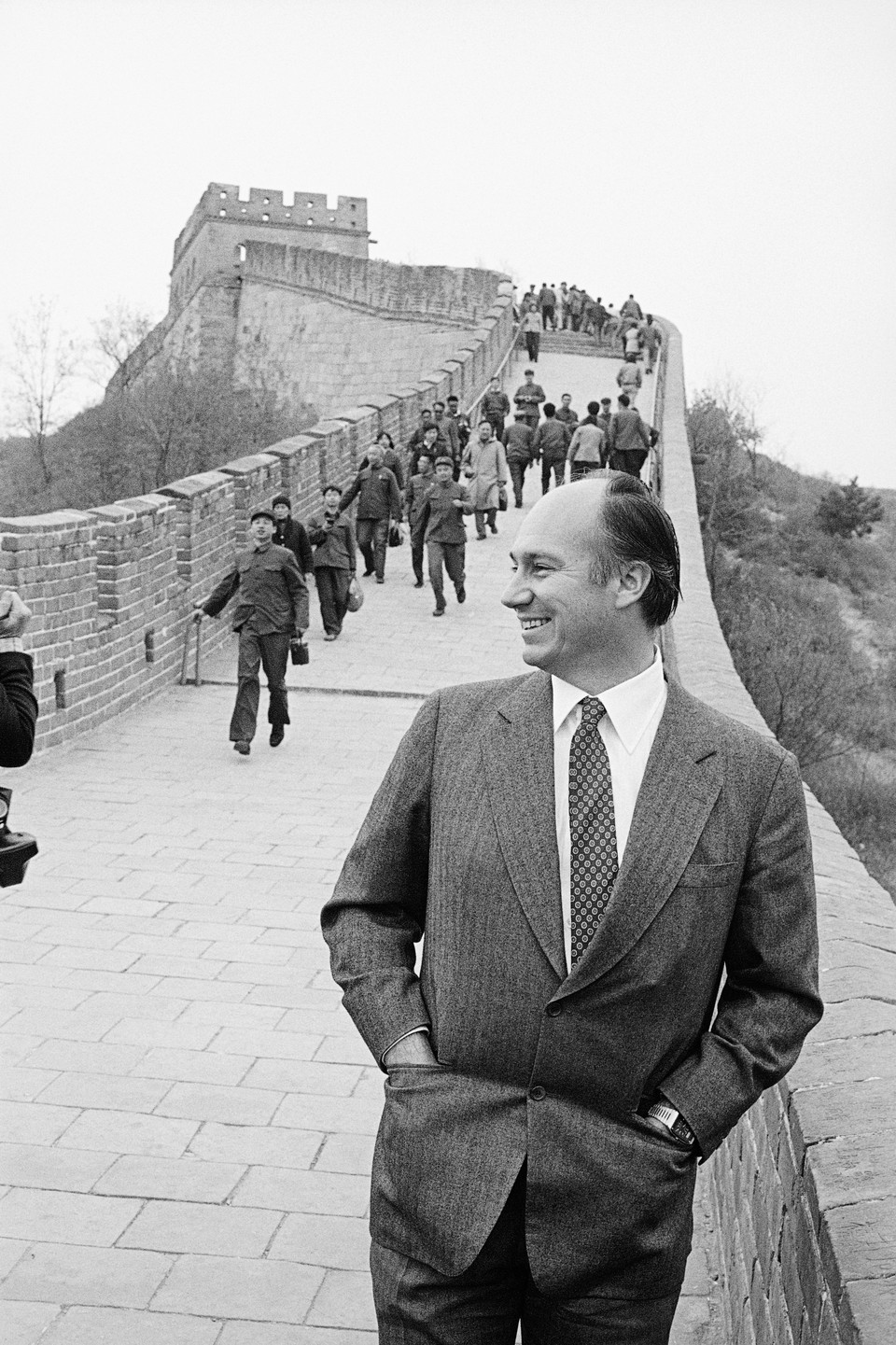
 Google Translate
Google Translate
Society
A god on earth
16.09.2017 at 09.00
PHOTO CHRISTOPHER LITTLE / AKDN
Aga Khan IV descends from the Prophet Muhammad and is the spiritual leader of 15 million Muslim believers, 10,000 of whom live in Portugal. He is one of the richest and most influential men in the world, which he has tried to transform in his own way and that of Islam. He is about to establish his residence in Lisbon. It will be the new mr. Gulbenkian
Alexandra Carita
Alexandra Carita
It is Prince Karim Aga Khan IV. But they call it Your Highness. The title was given to her by Elizabeth II, Queen of England, shortly after Karim, at the age of 20, assumed the position of Imam, the 49th Imam of the 15 million Ismaili Shi'ite Muslims. About a month ago, on July 11, he began celebrating his diamond jubilee and prepared to leave the region of Paris and settle in Lisbon.
He is one of the richest men in the world, according to foreign trade journals, which recently put his fortune at nearly $ 14 billion. But he is at the same time the spiritual leader of a community that gives to the Imamate, which he himself manages, about 10 to 12% of what he earns. The Aga Khan Development Network (AKDN), a kind of private United Nations, as it has been described, puts millions and millions at the service of the faithful and the society in which they are inserted in more than 25 countries mostly in Central Asia, Sub-Saharan Africa, the Middle East, Europe and North America.
With multiple functions and far beyond the religious orientation and interpretation of the Koran, Karim Aga Khan is in charge of the civic education of the community, which flatters him. It means taking care of their well-being and guiding them to create their own livelihoods and careers based on those guidelines. "My duties are much wider than those of the Pope. He only has to worry about the spiritual well-being of his flock, "he said one day. Prince Aga Khan directs his faithful in terms of education and health, as well as finance and economics, ethical and social values. A list of areas that the constitution it created in 1986, ratified in 1998, clearly describes and follows throughout the world and in all communities through national councils. Portugal is no exception. Almost 10 thousand Ismailis live in the country, especially in Greater Lisbon, and Aga Khan has not stopped investing in Portuguese land with protocols signed in several areas, from science to culture, through education and sustainability.
"The signing of the historic agreement between Imamat Ismaili and the Portuguese Republic to establish its headquarters in Portugal is a historical milestone in our 1400 years of history. We share with Portugal the values ​​of tolerance in the diversity of communities and cultures and we have an immense respect for the country's commitment to share knowledge for the improvement of communities around the world, "says Karim Aga Khan to Expresso.
In Pakistan in 1970, on a visit to a school founded by grandfather Aga Khan III
In Pakistan in 1970, on a visit to a school founded by grandfather Aga Khan III
PHOTO CUMBER STUDIOS / AKDN
That is why the prince decided to create the first physical seat for the Imamate, which always functioned through a secretariat that accompanies the imam at his residence in the Palacete Henrique Mendonça (former rectory of the New University of Lisbon) more perennial, lately Aiglemont, 40 kilometers from Paris. A luxurious castle, like the other dwellings of His Highness - notably in Sardinia and Geneva - which on its 40 hectares of land sees the most expensive purebloods of the most prestigious horse races in the world. It is the creation of these pedigree animals, moreover, a business in the hands of the family for over a century, which offers Karim a large part of his personal fortune (but the money also comes to him from real estate, which dominates the world ).
The jockeys of the Chantilly domain are famously dressed in green and red silk shirts, the Imamato colors. How famous are the appearances of the prince at the Prix Diane, the annual race that marks the most sought-after trophy in France in June. This high point of European horse racing takes place on a Sunday, and this is a sacred day to see Aga Khan, so rare are his worldly public performances. Last Friday, September 1, he made an exception and appeared in public in Almancil, Algarve, to celebrate with his friend Francisco Pinto Balsemão his 80th birthday.
The prince has always been the subject of the overwhelming interest of the pink press and much of it has been written about both his predilection for boats and yachts and his suitors, women, and millionaire divorces.
Karim has four children from two marriages. In 1968, she fell in love with the slender Sally Chrichton, a tall blond model who knows
